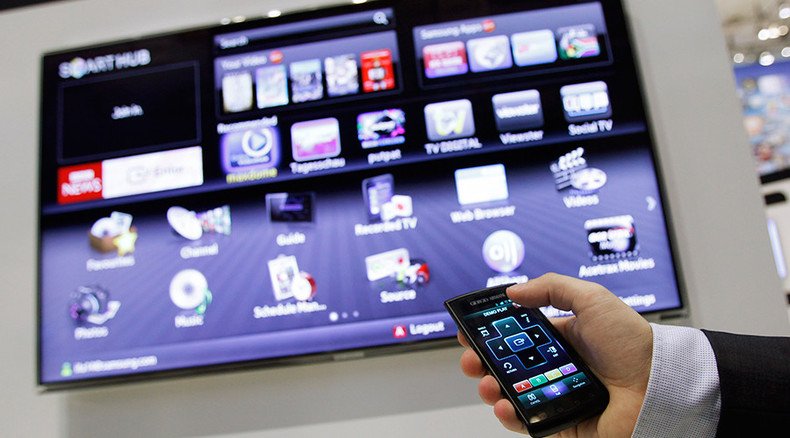For science! US government says it's OK to hack your car, tablet or smart TV

The Library of Congress just granted a set of copyright exemptions, giving the owners of smart TV sets and cars the ability to tinker with their devices without violating copyright law. This will allow the installation of third-party software.
Every 36 months, the US Copyright Office – a division of the Library of Congress – meets to hear petitions and review the Digital Millennium Copyright Act’s (DMCA) provision 1201. The provision is the anti-circumvention part of the law that had, in the past, made it illegal to ‘unlock’ your smartphone from its carrier and helped corporations protect copyrighted material.
READ MORE: TPP copyright provision: Countries to adjust their laws to match US policy
The Software Freedom Conservancy, an organization that supports open-source software, took advantage of this period of review by petitioning for an exemption to the DMCA that would allow people to ‘hack’ their smart TVs. The exemptions were granted on Tuesday, but they are only set to last three years – until the next review cycle.
The new rules are meant to allow for “lawful modification” and “good faith security research.”
The Library of Congress wins one for DIY folks. Sorry, can't get enough of this Librarian-as-Auto-Regulator story: https://t.co/ELJjAiVERd
— Ryan Streeter (@streeterryan) October 28, 2015The surprisingly far-reaching exemptions were approved even as concerns that ‘jailbreaking’ would allow the installation of movie piracy software like Popcorn Time. The US Copyright Office ruled that allowing hacking devices for the purpose of interoperability and installing software is legitimate.
While you can continue to legally jailbreak your phone, you can now do the same with your tablet and smart TV. E-readers, laptops and desktop computers are still off-limits. The hacking of video game consoles is also prohibited, as the Copyright Office found that removing their limitations is correlated with the piracy of video games.
Also included is an exemption for teachers, allowing them to circumvent access controls on DVDs so they can, for example, put together clips from several copyrighted works for educational purposes.
The decision includes language that addresses concerns opponents of the move, who contend that it would be used to facilitate the piracy of copyrighted media. Instead, the Register of Copyrights argues, users tinkering with their smart TVs could gain legitimate uses and increased functionality.
READ MORE: Ruling in ’dancing baby’ case could curb copyright censorship
"The Register also found that the prohibition on circumvention is adversely affecting legitimate non-infringing uses of smart TV firmware, and that the proposed alternatives to circumvention, such as connecting a laptop computer to the TV, are inadequate, because they would not allow installation of software on the smart TV to improve its functioning as a TV, such as facilitating more prominent subtitles,” the decision reads. “The Register also concluded that no evidence was submitted to illustrate opponents’ claim that ‘jailbreaking’ of smart TVs will make it easier to gain unauthorized access to copyrighted content, or that it would otherwise undermine smart TVs as a platform for the consumption of expressive works."
Copyright Office Rules: Yes, Security Researchers May Hack Cars (And A Couple Other Things) For Science https://t.co/7R9iRFBXNF
— Mark Mather (@RHAF_HQ) October 27, 2015Perhaps the most futuristic-seeming outcome of this exemption is that car owners are now allowed to 'hack' their vehicles. The Library of Congress said that users are entitled to modify their own cars, which nowadays often involves altering software. The decision comes thanks to a concerted effort from the Electronic Frontier Foundation, which filed for two exemptions that coincided with the Volkswagen emissions scandal.
READ MORE: Volkswagen troubles piling on as emission scandal evolves
This move was opposed by automakers such as General Motors and tractor maker John Deere, who said the owners of vehicles ought to visit authorized repair shops to modify their cars rather than doing it themselves.
“Sensitive vehicle data could be easily manipulated, altered, or distributed – undetected – if these changes are implemented,” GM said in a statement, quoted by the Guardian.
Deere and GM previously drew controversy when they tried to argue to the Copyright Office that the owners of the vehicles that the companies manufacture didn’t fully own them, and therefore didn’t have the right to make "unauthorized" repairs to them.
Deere said that because their tractors are so fundamentally reliant on the software that is the company's intellectual property, those who purchase the vehicles only have “an implied license for the life of the vehicle to operate the vehicle.” GM had similarly argued that many people mistakenly “conflate ownership of a vehicle with ownership of the underlying computer software.”












